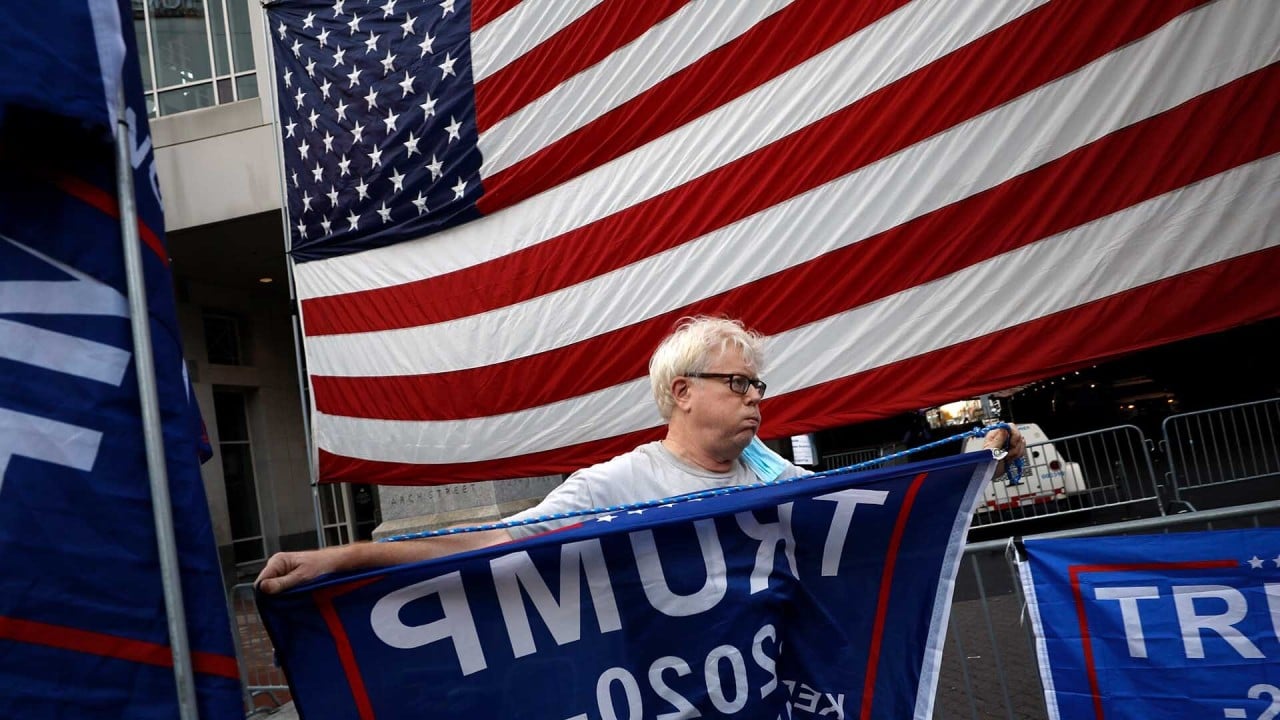
02:01
Disbelief among Trump voters in Pennsylvania as Pence says US presidential election ‘ain’t over’

China-bashing rhetoric aside, the world is becoming more hostile towards China. In a recent survey by the Washington-based non-partisan Pew Research Centre, 66 per cent of American respondents viewed China unfavourably, while 71 per cent didn’t trust President Xi Jinping. Similarly, other Western countries’ negative views of China and its leader are at historic highs.
There is widespread dissatisfaction among the advanced economies with China’s handling of the coronavirus pandemic, although they also see China as a top, if not the top, economic power.
Then there are the American policy wonks who believe China is out to replace the United States as the global hegemon. To them, China’s assertiveness in the South China Sea looks like an Asian version of the US’ Monroe Doctrine, only this is meant to push America out of the Asia-Pacific.
Worse, Chinese hi-tech companies are increasingly eating the lunch of their American counterparts. And China’s triumphant “wolf warrior” rhetoric is just more salt in the wound of an America in apparent decline.
Such negativity towards China is now deeply entrenched in America, across the political divide. The incoming Joe Biden administration is unlikely to go soft on China. It may eschew unilateralism and adopt a multilateral approach to China, leveraging European and other support to pressure Beijing into changing its behaviour. Tellingly, China is among the global threats to be addressed at a “Summit for Democracy” Biden plans to host during his first year in office.

02:01
Disbelief among Trump voters in Pennsylvania as Pence says US presidential election ‘ain’t over’
While China is not everyone’s cup of tea, the fact remains that by 2018, 128 out of 190 countries in the world traded more with China than the US. So, even if many have a desire for some resistance to China’s growing global clout, few would want to have to take sides openly.
Nevertheless, when the world’s hegemon and its allies are having a China scare, it doesn’t bode well for China’s push to be a responsible and likeable great power.
Compared to the outgoing US president, Donald Trump, Biden is likely to be more consistent and less capricious – though no less demanding of China. He is more likely to play fair and seek cooperation on common issues like climate change and North Korea.
In other words, a Biden presidency may present an opportunity for China to change tack, and with good results. However, with Trump earning more than 71 million votes – a record number for a losing candidate – Trumpism should remain robust after he has gone. Four years down the road, the window of opportunity offered by Biden might not exist.
This is how Beijing should seize the moment. First, get the message firmly across that China is neither able nor willing to unseat the US as the global superpower. China cannot compete with America, which has a military presence in 80 countries and whose military expenditure is 38 per cent of the global total – more than the next 10 countries’ combined. China has a largely closed capital account, and there is no way the renminbi can surpass the US dollar any time soon.
Second, cut out the wolf warrior rhetoric, whether in diplomacy or on social media. China would have to do a better job responding to criticism. Repeating stock phrases that other countries should not interfere in its affairs is no answer.
Third, work with the US and the World Health Organization to end the global pandemic, including on the development, production and equitable distribution of vaccines to frontline health workers, the vulnerable and needy.
Fourth, actively cooperate with the Biden administration on climate change and the Paris Agreement. China could help bring back a green world through meaningful progress in hitting peak emissions by 2030 and achieving carbon neutrality by 2060.

02:14
Japan-US hold joint military drills including cyberwarfare training as concerns about China grow
Fifth, conduct regular joint naval patrols with the US forces in wider waters of the South China Sea, while managing the US’ provocative freedom of navigation operations that challenge China’s territorial claims. This would send a reassuring signal to the region and the rest of the world.
Sixth, set aside territorial disputes and work with neighbouring countries in the South China Sea on the joint management and exploration of natural resources, including fisheries, habitats and deep-sea energy resources.
Seventh, embrace free and fair trade. For starters, seek to join the Comprehensive and Progressive Agreement for Trans-Pacific Partnership (CPTPP), which a Biden presidency may wish to join too. China, Japan, South Korea, Australia, New Zealand and the 10 members of the Association of Southeast Asian Nations are due to sign the Regional Comprehensive Economic Partnership (RCEP) agreement this weekend.
Some flexible terms, including an early harvest scheme, should be offered to India to encourage its inclusion. Similarly, China should help bring to fruition an even larger free trade area including the US – a Free Trade Area of the Asia-Pacific (FTAAP).
Eighth, China should help North Korea become a rising economic powerhouse like Vietnam. The Vietnam war is a useful reminder of what works and what didn’t.
Ninth, reform the Belt and Road Initiative. Make it more transparent, and include more participants and stakeholders, including civil society. Focus on debt sustainability and environmental, social and governance goals. Work more closely with the World Bank and the UN Development Programme.
Last but not least, meet more milestones on the path to reform and opening up, whether or not they have been set in the 14th five-year plan – including issues like market reciprocity, state-owned enterprise subsidies, transparency, rule of law, human rights and goals including technological self-reliance and quality growth.
After all, a great deal of the market reforms set out during the third plenum of the Party Congress in 2013 have since stalled. This has resulted in mounting headwinds against China’s trajectory, including the middle-income trap, capital inefficiency, over-indebtedness, and drags on productivity.
China has vowed to double the size of its economy and become moderately prosperous by 2035. This is not an unattainable goal, assuming an annual growth rate of 4.8 per cent for the next 15 years, foreign hostility notwithstanding. However, if the world’s legitimate misgivings about China are not addressed, they will only solidify and multiply, perhaps even derailing the Chinese dream.
China is the first major economy to emerge from the pandemic, as a more receptive Biden presidency beckons. Now is the time for China to transform itself into a more likeable and trusted great power, bringing peace, stability, prosperity and reconciliation to a divided world.
Andrew K.P. Leung is an independent China strategist. [email protected]